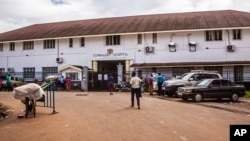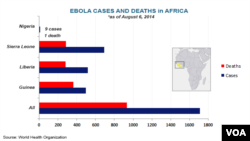Police and soldiers in Sierra Leone blockaded rural areas hit by the deadly Ebola virus on Thursday, a senior officer said, after neighboring Liberia declared a state of emergency to tackle the worst-ever outbreak of the disease, which has killed 932 people.
Liberian President Ellen Johnson Sirleaf announced emergency measures late on Wednesday that will, for 90 days, allow her government to curtail civil rights by imposing quarantines on badly affected communities to contain an epidemic that has struck four West African nations.
In Geneva, World Health Organization (WHO) experts were due to hold a second day of meetings to discuss emergency measures to tackle the outbreak and whether to classify it as an international public health emergency.
'Complete blockade'
In eastern Sierra Leone - the worst-hit area of the country - the head of police said security forces deployed last night "to establish a complete blockade" of Kenema and Kailahun districts, setting up 16 checkpoints on major roads.
"No vehicles or persons are allowed into or out of the districts," Alfred Karrow-Kamara told Reuters, saying the measures would last for an initial 50-day period.
He said traders who had registered with security agencies would be able to bring in food and medicines. Security forces would mount foot patrols to ensure civilians did not slip past their roadblocks through the bush.
Though the vast majority of cases are in the remote border area of Guinea, Sierra Leone and Liberia, concern over Ebola's spread grew last month when a U.S. citizen died in Nigeria of the virus after arriving from the region.
A nurse who treated him has now also died in Lagos, and at least five other people have been isolated with symptoms.
In Saudi Arabia, a man suspected of contracting Ebola during a recent business trip to Sierra Leone also died early on Wednesday in Jeddah.
Some major airlines, such as British Airways and Emirates, have halted flights to affected countries, while many expatriates are leaving, officials have said.
Death toll
In Liberia, where the death toll is rising fastest, authorities on Wednesday shut a major hospital after its Cameroonian director died of Ebola and six other staff tested positive, including two nuns and a 75-year-old Spanish priest.
In a nationwide address late Wednesday, Sirleaf said Liberia must take "extraordinary measures" to protect people's lives and the survival of the state.
"Including, if need be, the suspension of certain rights and privileges," she said. "Ignorance, poverty, as well as entrenched religious and cultural practices continue to exacerbate the spread of the disease especially in the counties."
She warned that some civil liberties could be suspended as needed, and by Thursday soldiers already were restricting movements on the roads to the capital, Monrovia, witnesses said.
Some soldiers were deployed to the crossroads town of Klay about 25 miles (40 kilometers) west of Monrovia in an effort to stop people from three Ebola-infected counties from coming closer to the capital.
Sirleaf said in a statement late Wednesday that 32 health workers had already died of the disease and many sick people were going untreated after doctors deserted their posts. Schools across the country were shut last week and non-essential government workers temporarily laid off.
Military deployment
With Liberian troops being deployed to quarantine badly hit communities, Sirleaf said the state of emergency was necessary for "the very survival of our state and for the protection of the lives of our people."
The military deployment - Operation White Shield – is expected to be fully in place by Friday, officials said. In the ramshackle, ocean-front capital, residents greeted the announcement with alarm.
"This is the beginning of hardship. Ninety days of fear and suffering," said Nancy Poure, a small trader in the suburb of Johnsonville. "We need help from America. We need help."
While the outbreak has now reached four countries, Liberia and Sierra Leone account for more than 60 percent of the deaths, according to WHO.
After a trial drug was administered to two U.S. charity workers infected in Liberia, three of the world's leading Ebola specialists urged the WHO to offer people in West Africa the chance to take experimental drugs to fight the disease.
Trial drug controversy
The two Americans were struck with Ebola while treating patients in Liberia. They are now at a hospital in the U.S. city of Atlanta, where they are said to be improving.
Liberian authorities have said they are willing to authorize in-country clinical trials.
President Barack Obama said on Wednesday he lacked enough information to approve the use of experimental drugs, adding that Ebola could be controlled with a strong public health response.
Meanwhile, the WHO says that next week it will convene an ethics panel to discuss the use of an experimental treatment for Ebola.
There is no known cure or vaccine for Ebola. Patients may experience fever, vomiting, diarrhea, body aches and uncontrollable bleeding from all openings in the body, including the eyes, mouth and ears.
The outbreak in West Africa is the deadliest ever for the disease, first detected nearly 40 years ago in central Africa.
Some information for this report provided by AP.






